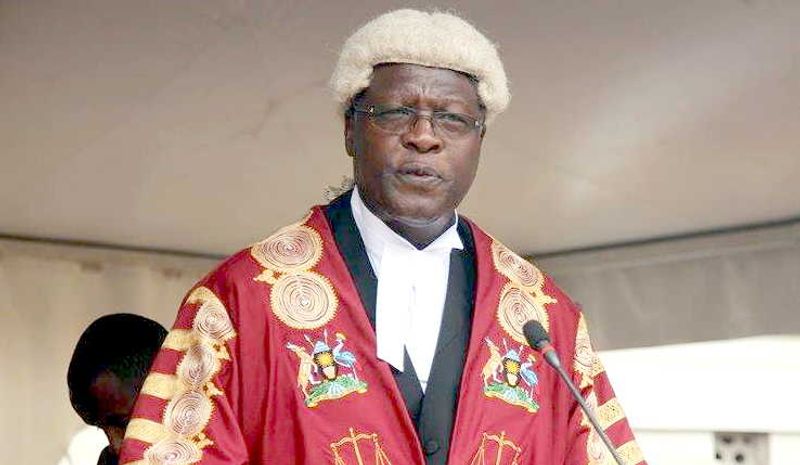
Vow to push for a financially autonomous Judiciary
A number of civil society organisations working in the area of human rights have supported judicial officers in their ongoing sit-down strike against low pay.
The strike by judges and other judicial officers that started on Monday has continued in most lower courts, pending a decision by government over the long-standing pleas for a salary rise.
President Museveni was expected to meet the Chief Justice and other senior justice ministry officers today Thursday Aug 31, to resolve issues.
The CSOs have also formed a coalition to push for greater independence of the judiciary saying that the current situation has left the third arm of government in limbo with poor working conditions compared to other government agencies.
According to a statement issued by the coalition under the current salary structure a Grade two magistrate earns shillings 737,837 per month. A grade 2 magistrate earns Shillings 860,810, a principal Magistrate Grade Two gets shillings 1.2 million a month.
Grade One Magistrates earn Ushs2.2 million while the Chief Magistrate earns Ushs2.4 Million. The Assistant Registrar earns Ushs3.1 million and the chief Registrar earns shillings Ushs4.8 Million.
Most of the striking judicial officers have drawn comparisons with other civil servants in most government authorities such as Kampala Capital City Authority (KCCA), Uganda National Roads Authority (UNRA) where drivers and office messengers earn more than chief magistrates.
The Vice President of The Uganda Law Society Alice Namuli says that the kind of pay given to judicial officers is not proportionate to the amount of work the judges do and the different circumstances they are exposed to as they do their work.
Civil society activists add that the because most of the judicial officers are supposed to be excluded from the general public, they end up living a lifestyle that subjects them to high costs of living, not forgetting that they are also affected by inflation.
In the same realm of supporting for better working conditions of judicial officers, the CSOs have formed a Coalition through which they say they plan to push for greater independence of the judiciary.
The coalition includes; Uganda Law Society, Centre for Public Interest Law, FIDA Uganda, Chapter Four, Foundation for Human Rights Initiative, Legal Aid Services Providers (LASPNET), the Anti-Corruption Coalition Uganda (ACCU).
Representatives of these organisations held a news conference this morning in which they pinned low pay disparities between judicial officers and other civil servants on the absence of a law that gives the judiciary some sense of financial autonomy.
“As Uganda Law Society and the entire coalition we have decided push for the administration of Justice bill which intends to get the autonomy of the judiciary,” said Sylvia Namubiru Mukasa, the Executive Director, Legal Aid Service Providers (LASPNET).
Coalition members decried what they termed as a breakdown of the rule of law.
Members of the coalition indicated that the on-going strike has greatly undermined the rule of law and observance of human rights since the judiciary – as an army that is supposed to protect the rights of millions of people continues to keep its doors closed.
Sylvia Namubiru Mukasa, the Executive Director of Legal Aid Service Providers (LASPNET) told this reporter in an exclusive interview that the ongoing sit-down strike by judicial officers is an indicator of a breakdown in the administration of justice and a disservice to the population.
Namubiru says that the sit-down strike has denied people access to courts and hence violated their human rights.
“We do not have rule of law as of now because one arm of government is not working,” But Namubiru was quick to defend the Chief Justice Bert Magunda Katureebe, whom she described as also being a victim of the ongoing strike.
“It is on record that he has been advocating for increased funding, human resource independence of the judiciary. Katureebe has been demanding for more support to the Judiciary even during the time he served the Attorney General of Uganda,”, says Namubiru.
The legal experts called on Parliament to expeditiously pass of the Judicial Administration Bill into law to ensure the Independence of the Judiciary so as to guarantee rule of law in the country.
Meanwhile the Former Ethics and Integrity Minister Dr. James Nsaba Buturo says whereas the Judicial officers have a point in demanding for better remuneration, they ought to have taken a better approach since the Judiciary is part of government.
In an interview with The Sunrise Newspaper about the impasse, Buturo who is also the Bufumbira East MP says that the judicial officer’s action may reflect a bad example to other civil servants in the country.
“Something is wrong in our society, never before have we had a situation where there is large scale strike, boycotts, that suggest something is wrong, never before have we had an important arm of government paralyzing the functioning of the judiciary, never before”-Buturo noted with concern.
Buturo further notes that what is happening shows that the country is suffering from a shortage of men and women who truly come to serve their country.
“it is true they (Judicial officers) have a case in my view but to go to that extent of paralysing government is not the way to go. Something is going wrong…..but it also calls the government to be vigilant, I think there has to be a thorough examination across board in so far as wages and salaries are concerned to avoid this kind of situation,” Buturo concludes.
The writer, Solomon Lubambula can be reached on slubambula{at}gmail.com















Solomon Lubambula
Leave a Comment
Your email address will not be published.